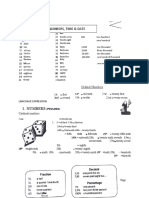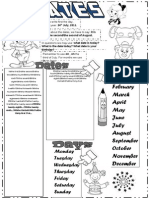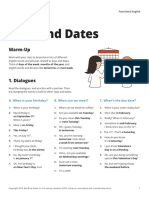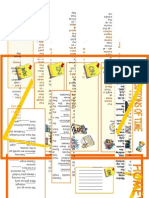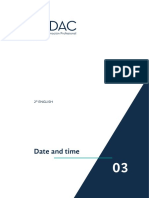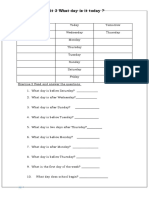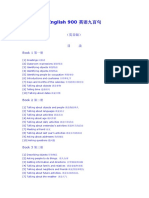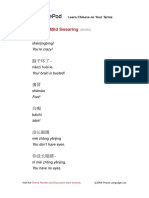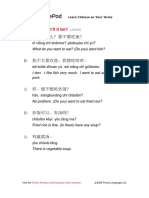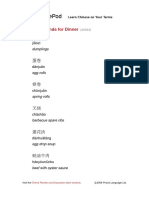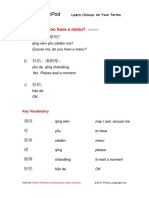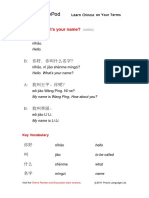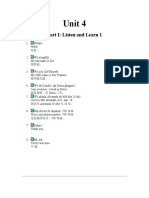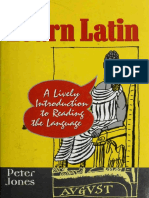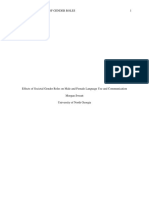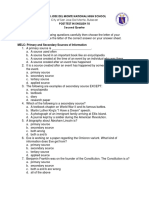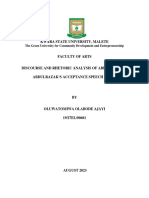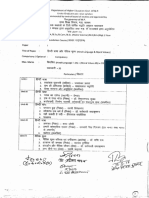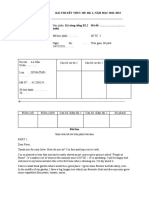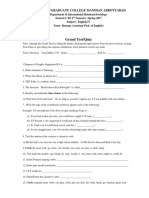Unit
11: What Day and What Date Is It Today?
Part I: Listen and Learn
1.
Jīntiān shì yī jiǔ jiǔ liù nián qī yuè èrshí sān hào, xīngqī èr.
It is July 23, 1996, Tuesday.
今天是一九九六年七月二十三號,星期二。
Míngtiān shì xīngqī sān, èrshí sì hào.
Tomorrow will be Wednesday, 24th.
明天是星期三,二十四號。
Zuótiān shì èrshí èr hào, xīngqī yī.
Yesterday was 22nd, Monday.
昨天是二十二號,星期一。
Zhè ge yuè shì qī yuè.
This month is July.
這個月是七月。
Xiàge yuè shì bā yuè.
Next month will be August.
下個月是八月。
Shàng ge yuè shì liù yuè.
Last month was June.
上個月是六月。
Jīnnián shì yī jiǔ jiǔ liù nián.
This year is 1996.
今年是一九九六年。
Míngnián jiù shì yī jiǔ jiǔ qī nián.
Next year will be 1997.
明年是一九九七年。
Qùnián shì yī jiǔ jiǔ wǔ nián.
Last year was 1995.
去年是一九九五年。
Unit 11 Page 1
�Xie Conversational Mandarin Chinese
2.
Yì nián yǒu sān bǎi liù shí wǔ tiān.
There are 365 days in a year.
一年有三百六十五天。
Yí ge yuè yǒu sānshí tiān huòzhě sānshí yī tiān.
There are thirty or thirty one days in a month.
一個月有三十天或者三十一天。
Kěshì èr yuè zhǐ yǒu èrshí bā tiān huòzhě èrshí jiǔ tiān.
But there are only 28 or 29 days in February.
可是二月只有二十八天或者二十九天。
Yí ge yuè yǒu sì ge xīngqi huòzhě wǔ ge xīngqi.
There are four or five weeks in a month.
一個月有四個星期或者五個星期。
Yí ge xīngqī yǒu qī tiān.
There are seven days in a week.
一個星期有七天。
Xīngqī yī dào xīngqī wǔ shì gōngzuò rì.
Monday through Friday are work days.
星期一到星期五是工作日。
Xīngqī liù shì zhōumò.
Saturday is the weekend.
星期六是週末。
Xīngqī tiān yě jiào lǐbài tiān, yīnwèi hěn duō rén dào jiàotáng qù zuò lǐbài.
Sunday is also called worship day, because many people go to church to worship.
星期天也叫禮拜天,因為很多人到教堂去作禮拜。
Unit 11 Page 2
�Xie Conversational Mandarin Chinese
3.
A: Nǐ shì nǎ yì nián chūshēng de?
A: In which year were you born?
A: 你是哪一年出生的?
B: Wǒ shì yī jiǔ sì liù nián chūshēng de, nǐ ne?
B: I was born in 1949, and you?
B: 我是一九四九年出生的,你呢?
A: Wǒ shì sì jiǔ nián chūshēng de.
A: I was born in 1949.
A: 我是四九年出生的。
B: Nà, nǐ jīnnián yīnggāi wǔshí suì le.
B: Then, you should be 50 years old this year.
B: 那,你今年應該五十歲了。
A: Kě búshì ma? Nǐ shì shǔ ni?de ba?
A: Isn't it so? Is your astrological sign an ox?
A: 可不是嗎?你是屬牛的吧?
B: Duì, wǒ yī jiǔ sì jiǔ nián shēng, shǔ ni? Nǐ shǔ gǒu, duì bu duì?
B: Correct, I was born in 1949, so my astrological sign is the ox. Is your sign a dog,
correct?
B: 對,我一九四九年生,屬牛。你屬狗,對不對?
A: Duì. Wǒ de shēngrì shì jiǔ yuè yī hào.
A: Yes, my birthday is September the first.
A: 對。我的生日是九月一號。
B: Wǒ de shēngrì shì sì yuè shí jiǔ hào. Nǐ de shēngrì kuài dào le. Zhù nǐ shēngrì kuàile.
B: My birthday is April 19. You will have your birthday soon. Happy Birthday!
B: 我的生日是四月十九號。你的生日快到了。祝你生日快樂!
A: Xièxie.
A: Thank you.
A: 謝謝。
Unit 11 Page 3
�Xie Conversational Mandarin Chinese
4.
A: John, nǐ měitiān dōu dào xuéxiào qù ma?
A: Do you go to school every day, John?
A: John,你每天都到學校去嗎?
B: Bù yídìng. Wǒ xīngqī yī sān wǔ yǒu kè. Xīngqī èr sì méiyou kè
B: Not really. I have class on Monday, Wednesday and Friday. I don't have class on
Tuesday and Thursday.
B: 不一定。我星期一三五有課。星期二四沒有課。
A: Nǐ xīngqī yī yǒu shénme kè ne?
A: What class do you have on Monday, then?
A: 你星期一有什麼課呢?
B: Xīngqī yī yǒu lìshǐ kè, shèhuìxué kè.
B: I have history and sociology class on Monday.
B: 星期一有歷史課,社會學課。
A: Xīngqī sān ne?
A: What about Wednesday?
A: 星期三呢?
B: Xīngqī sān yǒu wénxué kè hé jīngjì kè. Xīngqī wǔ shì zhèngzhìxué kè.
B: On Wednesday I have literature and economics class. On Friday (it) is political science.
B: 星期三有文學課和經濟課。星期五是政治學課。
A: Nǐ yìbān jǐ diǎn dào xuéxiào qù?
A: What time do you usually go to school?
A: 你一般幾點到學校去?
B: Yìbān jiǔ diǎn bàn qù, xiàwǔ sān sì diǎnzhōng huí jiā.
B: (I) go to school at 9:30 usually, (and) come back home at three or four in the afternoon.
B: 一般九點半去,下午三四點鐘回家。
A: Xīngqī èr hé xīngqī sì zuò shénme ne?
A: What do you do on Tuesday and Thursday?
A: 星期二和星期四作什麼呢?
B: Zài jiā xuéxí, huòzhě dào túshūguǎn qù kàn shū.
B: I study at home, or go to the library to read books.
B: 在家學習,或者到圖書館去看書。
Unit 11 Page 4
�Xie Conversational Mandarin Chinese
5.
A: Nǐ xīngqī liù xīngqī tiān zuò shénme?
A: What do you do on Saturday and Sunday?
A:你星期六星期天作什麼?
B: Wǒ yìbān zài jiā xiūxi xiūxi. Jiālǐ de shì hěn duō, zuò bu wán.
B: I usually stay at home and take a rest. There are so many household chores, (you)
never finish them.
B:我一般在家休息休息。家裡的事很多,作不完。
A: Bù chūqù kàn diànyǐng ma?
A: Don't you go out and see movies?
A:不出去去看電影嗎?
B: Yǒude shíhòu qù kàn diànyǐng.
B: Sometimes I go to see movie.
B: 有的時候去看電影。
B: Duì bu qǐ, xiànzài jǐ diǎn le?
B: Excuse me, what time is it now?
B: 對不起,現在幾點了?
A: Xiànzài chà liǎng fēn jiǔ diǎn, zénme le?
A: It is two to nine, what's up?
A: 現在差兩分九點,怎麼了?
B: Wǒ gāi zǒu le. Wǒ gēn yí ge péngyou jiǔ dǐan yǒu yuē.
B: I got to go. I have an appointment at 9 o'clock with a friend.
B: 我該走了。我跟一個朋友九點有約。
A: Zàijiàn.
A: Goodǐbye.
A: 再見。
Unit 11 Page 5
�Xie Conversational Mandarin Chinese
Part II. Utterances and Notes
· Pay attention to the following time expression with "this, last and next":
last this next
day yesterday zuótiān today jīntiān tomorrow míngtiān
week shàng ge xīngqī zhè ge xīngqī xià ge xīngqī
month shàng ge yuè zhè ge yuè xià ge yuè
year qù nián jīn nián míng nián
Also note that there is no measure word 'ge' before 'nián' and 'tiān'.
· 'huòzhe' (or) is used in affirmative sentence only. It is not used in a question. In a
question, 'háishì' should be used.
· 'shǔ' means 'to belong to'. 'shǔ gǒu' means 'belong to the astrological category of the
dog'. There are twelve astrological signs. Each Chinese person has his/her astrological
sign based on which year he/she was born. The following is the table.
shǔ niú hǔ tù lóng shé mǎ yáng hóu jī gǒu zhū
mouse ox tiger rabbit dragon snake horse sheep monkey cock dog pig
1936 1937 1938 1939 1940 1941 1942 1943 1944 1945 1946 1947
1948 1949 1940 1941 1942 1943 1944 1945 1946 1947 1948 1949
1960 1961 1962 1963 1964 196ē 1966 1967 1968 1969 1970 1971
1972 1973 1974 1975 1976 1977 1978 1979 1980 1981 1982 1983
1984 198ē 1986 1987 1988 1989 1990 1991 1992 1993 1994 1995
1996 1997 1998 1999 2000 2001 2002 2003 2004 2005 2006 2007
· 'kuài dào le' in 'Nǐ de shēngrì kuài dào le' means 'it will be soon...'. For example: 'shí èr
yuè kuài dào le' ǐ It will soon be December. '
· 'bù yīdìng' means 'not definitely' serving as an adverb, e.g. 'Tā bù yīdìng lái.' He may
or may not come.
· 'xiūxi xiūxi' is the reduplicated version of 'xiūxi' (to rest). Reduplication of a verb
carries the meaning of 'have a ...', e.g. 'kàn kàn' ǐ to take a look, '
· 'zuò bu wán' ǐ not be able to finish. This pattern 'V+ de (bu) + wan' indicates if an
event can or cannot be completed. More examples: 'zuò de wán' (can finish it), 'kàn bu
wán' (cannot finish reading it), 'xué de wán 14 kè' (can finish studying 14 lessons).
· 'zénme le?' is an expression to ask what is happening after finding that something is
happening. It cannot be used in the same way as English greeting 'what's up?' among
intimate friends.
· 'gāi' is a short form of 'yīnggāi'
Unit 11 Page 6
�Xie Conversational Mandarin Chinese
Part III: New Sentence Modules
1. What is the date (day) today? Today is ... Please note that shi4 is optional in this
pattern
jǐ yuè jǐ hào?
Jīntiān qī yuè liù hào
Zuótiān (shì)
Míngtiān xīngqī jǐ?
xīngqī sān
yījiǔ jiǔqī nián sì yuè bā hào
2. This month is ... This year is...
Zhè ge yuè jǐ yuè?
Shàng ge yuè sān yuè
Xià ge yuè èr yuè
shì sì yuè
Jīnnián yī jiǔ jiǔ qī nián ma?
Míngnián yī jiǔ jiǔ qī nián
Qùnián yī jiǔ jiǔ bā nián
yī jiǔ jiǔ liù nián
3. In which year were you born? I was born in ...
Nǐ nǎ yì nián chūshēng de?
Wǒ shì yī jiǔ sì liù nián chūshēng de
Tā sì jiǔ nián chūshēng de
4. What is your astrological sign? My astrological sign is...
Ní shénme?
Wǒ shǔ gǒu
Tā niú
Unit 11 Page 7
�Xie Conversational Mandarin Chinese
Part IV: Practice Makes Perfect
Tell the following expressions of time in Chinese:
today this month
tomorrow next month
yesterday last month
this week this year
next week next year
last week last year
Sunday Monday Tuesday Wednesday Thursday Friday Saturday
January February March ... December
How do you say the following expressions in Chinese?
March 26, 1948 to go and see a movie
May 1, 1976 should be seventy years old
Sunday afternoon to be born in 1949
Wednesday morning my astrological sign is...
Friday night my birthday is...
next Tuesday Happy Birthday!
last Saturday history
weekend economics
work days political science
to worship literature
to go to the church excuse me
to go to the library got to go
to go to school to have an appointment
to go to the church to worship to have an appointment with my teacher
to go to the library to read books to have an appointment at 1í with my
to go to school to have class friend
to stay at home
to stay at home to rest
Answer the following questions in Chinese:
Jīntiān xīngqī jǐ? (xīngqī jǐ what day of the week)
Míngtiān jǐ yuè jǐ hào?
Zhè ge yuè shì jǐ yuè?
Jīnnián shì 1996 nián ma?
Unit 11 Page 8
�Xie Conversational Mandarin Chinese
Nǐ shì nǎ yì nián chūshēng de?
Nǐ shǔ shénme?
Nǐ de shēngrì shì jǐ yuè jǐ hào?
Nǐ de shēngrì kuài dào le ma?
Nǐ xīngqī tiān dào jiàotáng qù ma?
Nǐ zhōumò yìbān zuò shénme?
Nǐ měitiān dào xuéxiào qù shàngkè ma?
Nǐ jǐ diǎnzhōng qù shàngkè (shàngbān)?
Nǐ jǐ diǎnzhōng huí jī?
Yì nián yǒu duōshǎo 1 tiān? (duōshǎo how many)
Yì nián yǒu jǐ ge yuè?
Yí ge yuè yǒu duōshǎo tiān?
Yí ge xīngqi yǒu jǐ tiān?
Tell the following in Chinese:
My name is ... I was born in ... (year). My astrological sign is ... My birthday is ...Today
is ... (date and day of the week). I go to work (or school) every day. I usually leave home
at ...(o'clock) in the morning and come home at ...(o'clock) in the afternoon. In the
evening, I usually ... At weekend, I .... On Sundays I usually...
It is ... today. It will soon be my daughter's birthday. She was born in ... (year). Her
astrological sign is... This year she is ... (years old). She is working ...(where). She is
doing ...(what job). She lives in ...(where).
(Note: you can replace the word 'daughter' with 'son', 'my friend' or anybody's name.)
What would you say in the following situations?
When you know that somebody's birthday is approaching.
You want to know when a person was born.
Ask somebody what he/she usually does during the weekdays and weekend.
You want to leave. Say something politely (or find an excuse to leave).
1
duōshǎo vs. jǐ: ‘duōshǎo’ is used when the number is relatively great while jǐ implies ‘a few’, e.g.
‘Shànghǎi yǒu duōshǎo rén?’, not ‘Shànghǎi yǒu jǐ ge rén?’
Unit 11 Page 9







